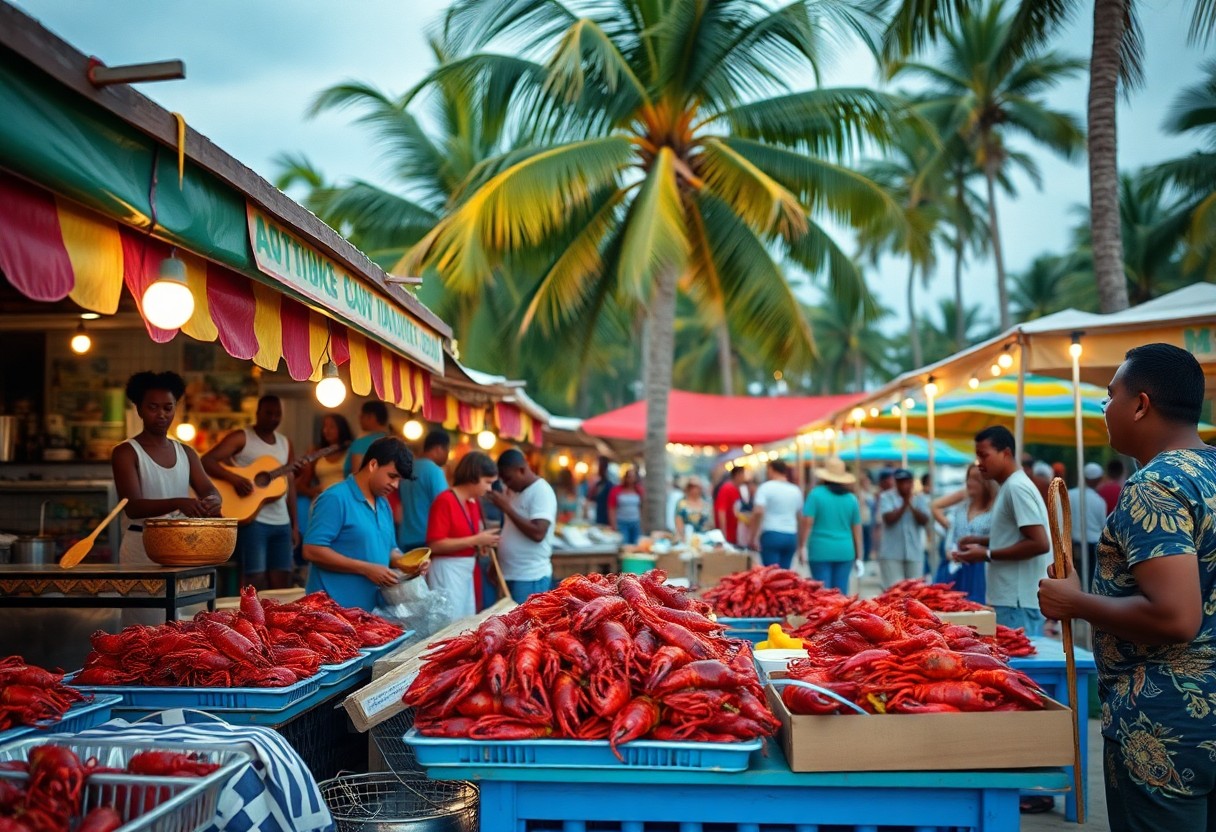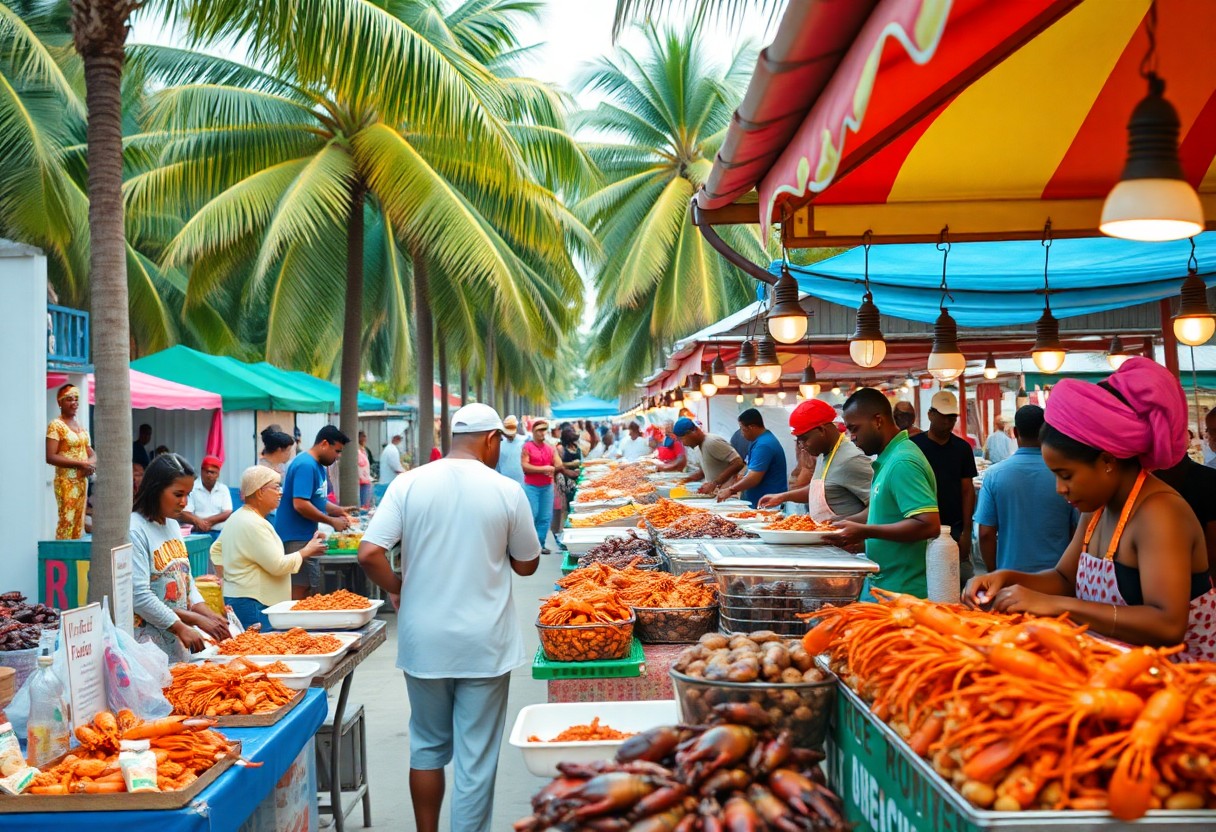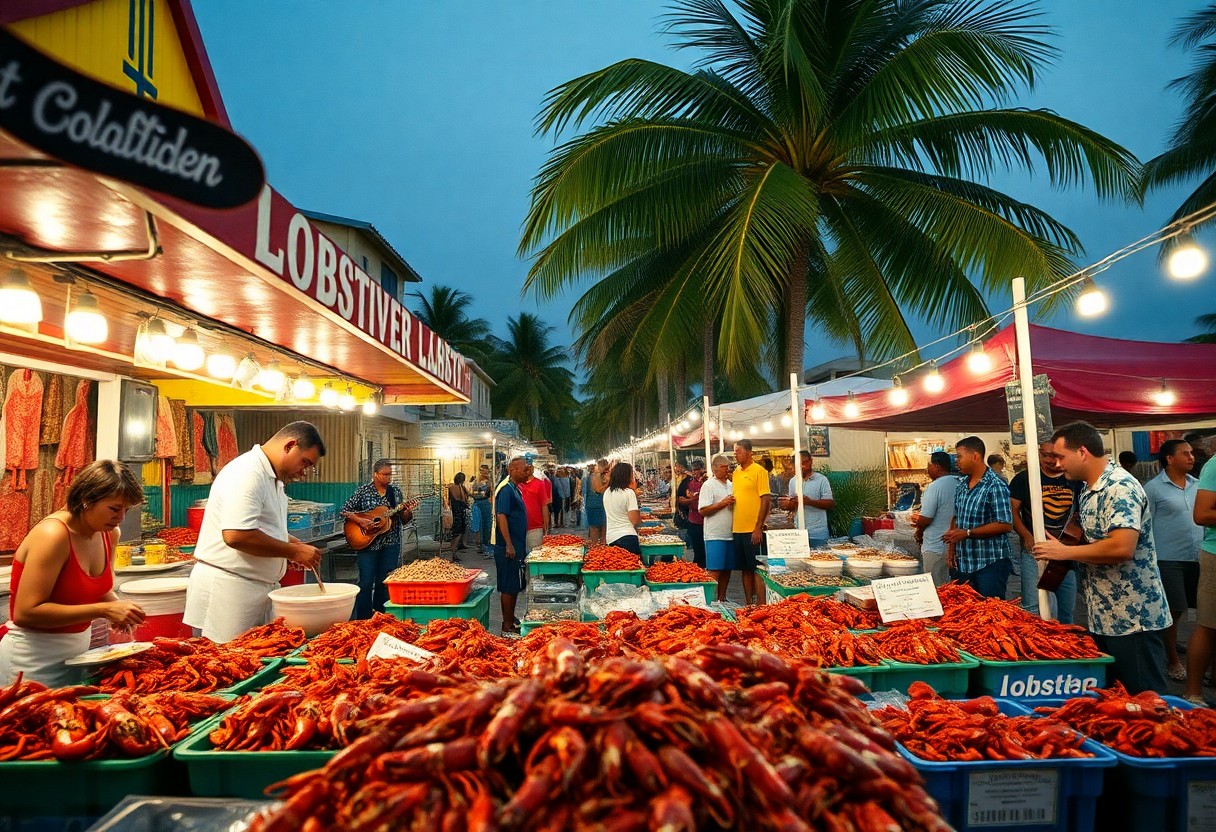Belize’s lobster festivals present a captivating fusion of cultural heritage and coastal festivities that enchant both locals and tourists. Participating in these lively festivals in Caye Caulker, San Pedro, or Placencia allows you to fully engage in a time-honored tradition that has thrived for decades. Each festival not only emphasizes sustainable fishing practices crucial for safeguarding Belize’s abundant marine resources but also supports local communities economically. From traditional grilling techniques to creative culinary innovations, these festivals provide an extraordinary opportunity to savor fresh, locally-sourced spiny lobster, thereby enhancing the economic vitality of coastal towns. Your participation enriches your culinary journey while actively contributing to the preservation of Belize’s vibrant cultural heritage and its fragile marine ecosystem.
Explore the Vibrant and Flavorful Belize Lobster Festivals
The Belize lobster festivals are more than just events; they are lively cultural celebrations that merge seafood gastronomy with rich community traditions. These enthusiastic gatherings radiate the warmth and hospitality that Belize is renowned for, while simultaneously showcasing the significance of sustainable fishing practices. With over 15,000 visitors each year at various locations, these festivals have firmly established themselves as key highlights of Belize’s cultural calendar, attracting both locals and international tourists alike.
Experience the Rich Diversity of Festival Activities Across Belize
- Caye Caulker Lobster Fest – Join the exciting celebration every July
- San Pedro Lobster Festival – Enjoy a two-week culinary extravaganza filled with flavors
- Placencia Lobster Fest – Participate in a lively beachside gathering with fun activities
| Festival Location | Unique Features |
|---|---|
| Caye Caulker | Engaging traditional cooking demonstrations showcasing local cuisine |
| San Pedro | Exciting lobster crawl events that bring the community together |
| Placencia | Festive beach parties that celebrate the local culture |
| Duration | 2 to 14 days of vibrant festivities |
| Peak Season | July to August, the ideal time to enjoy the celebrations |
Discover the Evolution of Belize’s Lobster Festival Traditions
The inception of the Belize lobster festivals is a significant milestone in the country’s cultural narrative, beginning in 1994 with the first Caye Caulker Lobster Festival, aimed initially at modest fundraising. Over time, these festivals have transformed from community gatherings into major tourism attractions. Today’s celebrations include exhilarating food competitions, festive beach parties, and insightful sustainable fishing demonstrations, reinforcing their importance to the local economy and the vibrant cultural identity of Belize.

Understanding the Role of Sustainable Fishing Practices in Belize
To fully appreciate Belize’s lobster industry, it’s essential to delve into their unwavering commitment to sustainable fishing. Local fishing communities strive to balance the excitement of the festivals with the critical need to conserve vital marine resources. Fishers adhere to strict size and weight regulations, ensuring that only mature lobsters are harvested. This includes maintaining a minimum tail weight of 4 ounces and a carapace length of 3 inches, both vital for the sustainability of lobster populations.
Understanding Fishing Regulations and Guidelines for Lobster Conservation
Fishing practices in Belize are governed by clear seasonal restrictions designed to protect lobster populations. The fishing season is from July 1 to February 28, allowing lobsters to reproduce during the off-season. The Belize Fisheries Department plays a crucial role in enforcing these regulations through regular monitoring and imposing heavy penalties for violations. By attending these festivals, you actively support essential conservation initiatives that benefit marine ecosystems and promote sustainable fishing practices.
Exploring Traditional Fishing Techniques in Belize’s Coastal Waters
Delving into Belize’s rich fishing heritage reveals that local fishers utilize three primary methods: lobster traps, diving with hooks, and lobster shades. These techniques have been refined over generations to minimize environmental impact while ensuring effective harvesting rates. For example, lobster shades—sustainable artificial shelters—provide safe havens for lobsters, significantly improving harvesting efficiency. These structures can remain submerged for 2-3 years, contrasting with traditional traps, which must be removed during the closed season. Understanding these methods enhances your appreciation for the preservation of fishing culture and marine ecosystems in Belize.

Planning for an Unforgettable Lobster Festival Experience
While the thrill of organizing a lobster festival is exciting, having a well-structured plan is essential for ensuring its success.
- Choosing an appropriate venue that can accommodate the expected crowd size is vital
- Obtaining permits and licenses in advance is crucial to avoid potential delays
- Coordinating with local vendors requires meticulous planning and clear communication
- Implementing safety measures that comply with health regulations is imperative for attendee safety
It is advisable to dedicate at least 3-4 months for thorough preparations to ensure a seamless event that meets the expectations of all participants.
Key Considerations for Effective Festival Planning and Execution
Successfully organizing your festival involves focusing on specific details that contribute to a smooth experience for all attendees.
- Weather considerations during the peak July-August season can significantly impact turnout
- Availability of an emergency response team is essential for ensuring participant safety
- Establishing waste management systems is crucial to maintain cleanliness and hygiene
- Crowd control measures should be implemented to ensure the safety of all participants
Once these critical elements are secured, you can shift your focus toward scheduling entertainment and activities designed to enhance the festival experience.
Ensuring Culinary Excellence and Safety at Your Lobster Festival
To ensure food quality at your festival, maintaining proper storage temperatures for lobster is essential. Vendors must possess food handling certifications and strictly follow local health guidelines. Each vendor booth should be equipped with adequate refrigeration and sanitation stations to guarantee the safety of food served to attendees.
Furthermore, upholding food safety standards throughout the event is critical. Clear guidelines for portion control and cooking methods should be established. Vendors need to maintain records of their lobster sourcing to comply with Belize’s fishing regulations, which stipulate a minimum tail weight of 4 ounces.
Boosting Economic Growth Through the Lobster Festivals in Belize
Belize’s coastal communities have experienced significant economic growth fueled by the popularity of lobster festivals. These vibrant events generate over $2 million annually in tourism revenue, which fosters job creation and strengthens local businesses. Your involvement in these festivals not only contributes to the sustainable fishing industry but also supports the preservation of traditional fishing practices that have been cherished for generations.
Transformative Economic Benefits for Belize’s Local Communities
Even the smallest fishing villages transform into vibrant tourist destinations during festival seasons. You’ll encounter local families managing food stalls, craft vendors offering unique souvenirs, and fishermen proudly displaying their fresh catches. The festivals create direct income opportunities for over 500 local families while simultaneously backing crucial marine conservation initiatives that benefit the entire community.
Identifying Key Drivers of Growth in the Lobster Festival Industry
An insightful analysis of Belize’s lobster festival landscape reveals several key growth drivers:
- Sustainable fishing practices that protect marine life and ensure long-term viability
- International tourism promotion that attracts visitors from around the globe
- Local culinary innovation that enriches the overall festival experience
- Community participation that fosters inclusivity and shared success
This collective impact has resulted in a remarkable 15% annual growth in festival attendance, underscoring the significance of these events to the local economy and community.
It’s essential to recognize that the success of these festivals relies on:
- Strict adherence to fishing regulations that ensure sustainability
- Quality control measures that maintain high standards for food and safety
- Environmental protection initiatives that safeguard marine ecosystems
- Robust tourism infrastructure that enhances visitor experiences and satisfaction
This sustainable approach promises long-term economic benefits for local communities and the environment, ensuring that future generations can continue to enjoy these cultural celebrations.
Commitment to Conservation Efforts in Belize’s Fishing Community
The preservation of Belize’s spiny lobster population is of critical importance, leading to the establishment of strict fishing regulations and seasonal restrictions. These proactive measures effectively maintain healthy lobster populations while supporting the livelihoods of local fishing communities. The closed season, which runs from March 1 to June 30, is essential for successful breeding and population recovery.
Proactive Environmental Protection Measures for Sustainable Fishing Practices
Even small actions can lead to substantial impacts in lobster conservation. Local fishers employ sustainable fishing methods such as lobster shades and regulated traps to minimize their environmental footprint. The minimum catch size of 4 ounces and a 3-inch carapace length ensures that juvenile lobsters have the opportunity to grow and reproduce before being harvested, promoting a balanced ecosystem and helping to maintain the biodiversity of marine life.
Empowering Community Education Initiatives for Future Generations
Your interest in local conservation efforts will be rewarded as you discover how Belize’s fishing communities teach traditional sustainable fishing practices to younger generations. Local organizations frequently host workshops focusing on responsible fishing methods and emphasizing the significance of adhering to regulations that protect marine life.
Furthermore, your participation in these festivals directly supports educational initiatives. The festivals serve as interactive platforms where attendees can engage with local fishers and learn about marine conservation efforts. These events help fund educational programs that teach both children and visitors about the importance of sustainable fishing practices and the need to protect Belize’s precious marine resources.

Maximize Your Enjoyment at the Lobster Festivals
Once you decide to attend a Belize Lobster Festival, it’s crucial to familiarize yourself with the safety guidelines and local regulations. Adhering to these best practices will not only enhance your festival experience but also promote sustainability and ensure the safety of all attendees during the celebrations.
Essential Vendor Guidelines for a Successful Festival
If you’re considering selling your products at the festival, it is imperative to obtain proper permits from local authorities. Your booth must comply with food safety standards, sourcing lobsters exclusively from licensed fishermen. Verification that all lobsters meet the minimum size requirement of 4 ounces and 3 inches carapace length is mandatory to ensure compliance with local regulations and to promote responsible fishing practices.
Visitor Tips for an Enjoyable Festival Experience
When attending the festival, it’s advisable to arrive early to enjoy the best selection of lobster dishes available. Your overall experience will be greatly enhanced by bringing cash, wearing comfortable shoes, and utilizing sun protection. Prior to making purchases, be sure to check the food preparation standards to ensure they meet health regulations and are safe for consumption.
Participating in festival activities requires attentiveness to safety protocols. You can enrich your experience by sampling various vendor offerings, joining in local dance celebrations, and supporting sustainable fishing practices. Festivals typically run from morning until late evening, with peak crowds occurring between 12 PM and 4 PM, so plan your visit accordingly to avoid long wait times.
Experience the Heart and Soul of Belize Lobster Festivals
Through your exploration of Belize Lobster Festivals, you can gain a deeper appreciation for how these events intertwine cultural celebration with sustainable practices. Attending any of these festivals—whether in Caye Caulker, San Pedro, or Placencia—provides you with a unique opportunity to indulge in the authentic flavors of Belize while actively supporting local communities. Witness firsthand how fishers adhere to stringent guidelines for lobster conservation, chefs craft exquisite dishes, and locals share their rich heritage. These festivals exemplify Belize’s dedication to harmonizing tourism growth with environmental stewardship, positioning them as a model for sustainable food festivals globally.
Your Questions Answered: Frequently Asked Questions about Belize Lobster Festivals
Q: When and where can I attend the Lobster Festivals in Belize?
A: The Lobster Festivals kick off at the start of lobster season on July 1st. The primary locations for these celebrations are Caye Caulker (since 1994), Placencia (since 1998), and San Pedro (since 2007). The San Pedro festival spans two weeks, while Caye Caulker and Placencia host weekend-long festivities, making them accessible to all.
Q: What measures does Belize implement to ensure sustainable lobster fishing practices during the festivals?
A: The Belize Fisheries Department enforces stringent regulations: lobsters must weigh a minimum of 4 ounces and have a carapace length of at least 3 inches. The fishing season lasts from July 1 to February 28. Fishers utilize sustainable methods such as lobster shades and traps, which must be removed during the closed season, ensuring compliance with regulations designed to protect lobster populations and promote sustainability.
Q: How do the Lobster Festivals economically benefit local communities?
A: The festivals create substantial income opportunities for local fishers, restaurant owners, and businesses during the tourism low season. Many restaurants actively participate in events like the lobster crawl, showcasing special lobster dishes that attract visitors. By drawing thousands of attendees, these festivals significantly bolster the local economy through food sales, accommodations, and tourism activities, providing fishing families with a reliable source of income while supporting sustainable fishing practices.
The Article Belize Lobster Festivals: A Celebration of History, Sustainability, and Prosperity appeared first on Belize Travel Guide
The Article Belize Lobster Festivals: Celebrating Sustainability and Culture Was Found On https://limitsofstrategy.com
The Belize lobster festivals truly shine a light on how cultural tradition and environmental consciousness can create a rich experience for both locals and visitors. I find it fascinating how these festivals not only showcase the culinary delights of spiny lobster but also serve as a platform for education about sustainable fishing practices. By engaging in such a time-honored celebration, attendees aren’t just passively enjoying incredible food; they are actively participating in a larger movement that prioritizes the health of Belize’s marine ecosystems.
It’s interesting how the Belize lobster festivals manage to weave together cultural pride and environmental responsibility into such a vibrant celebration. The way they highlight spiny lobster as a culinary delight is a fantastic approach, especially since it opens up conversations about sustainable practices not just for locals but for everyone who visits.
The Belize lobster festivals truly highlight the beautiful intersection of culture and sustainability. I remember visiting the festival in San Pedro a couple of years ago and being struck by how the local chefs showcased their culinary creativity while maintaining respect for traditional methods. It was fascinating to learn about the sustainable fishing practices and how they help protect the marine ecosystem for future generations.
I find the concept of Belize’s lobster festivals particularly fascinating, not just for the delicious food but for how effectively these events weave together culture, community, and environmental stewardship. There’s something truly special about sharing a meal that not only delights the palate but also carries the weight of local traditions and sustainable practices. It strikes me that this combination could serve as a model for other regions looking to preserve their cultural identities while engaging in responsible tourism.
It’s fascinating to see how the Belize lobster festivals not only celebrate culinary traditions but also play a vital role in community sustainability and environmental conservation. Having attended the festival in San Pedro last year, I was struck by the sense of community involvement. Locals showcased their grilling skills while sharing stories about their fishing practices, highlighting the importance of sustainable methods. It’s a beautiful reminder that our food choices can have a ripple effect on the ecosystem and local economies.
I couldn’t agree more with your insights on the Belize lobster festivals and their significance both culturally and economically! Having attended the festival in San Pedro last year, I was genuinely amazed by the vibrant atmosphere—it’s not just a food festival; it’s a celebration of Belizean identity and community spirit. The combination of local music, art, and of course, the incredible variety of lobster dishes made for an unforgettable experience.